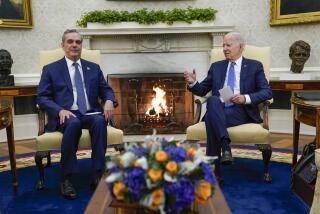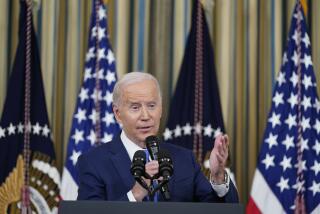Don’t Rely on U.S. Market, E. Asia Told : Shultz, in Indonesia, Urges Nations to Seek New Outlets for Goods
- Share via
JAKARTA, Indonesia — Secretary of State George P. Shultz on Monday bluntly warned the nations of East Asia that they should not count on expanding exports to the United States and should start trying to sell more goods elsewhere in the world.
“To ensure future growth, our trading partners must turn also to other markets or to domestic expansion,” Shultz said in what U.S. officials described as a major policy speech on future economic relations with Asia.
“The U.S. market is . . . not likely to absorb rapid growth in export of manufactures to the extent that it did earlier in this decade,” Shultz told the Indonesian Economists Assn.
Imbalance Being Cut
The thrust of his message was that America’s unprecedented trade imbalance, which reached $171 billion in 1987, has not been such a bad development, that it is gradually being reduced and that Asian governments should begin to make adjustments in their own trade strategies and economic policies.
U.S. officials said the speech was intended to serve notice throughout Asia that the era of huge American trade deficits is ending and that the region should be preparing for change.
As an indication of the strong reliance of Asian economies on the American market, Shultz pointed out that, in 1985, the six members of the Assn. of Southeast Asian Nations--Indonesia, the Philippines, Thailand, Malaysia, Singapore and Brunei--sold to the United States 56% of all the manufactured goods that they exported. Japan bought 12% of these nations’ exports and Western Europe 25%.
‘Mutually Beneficial’
“When the economic history of the 1980s is written,” Shultz said, “it will be recognized that the growth of the U.S. trade deficit, with all of its potentially troubling implications, was a mutually beneficial development--enabling world trade to expand while helping our own economic growth to proceed without inflation.”
He did not suggest that the U.S. market will be restricted for Asian exporters because of protectionism. His speech included the standard Reagan Administration denunciation of protectionism, which he termed “arson that eventually burns down everyone’s house.”
Shultz also said government policies in some Asian countries contribute to protectionist pressure in the United States. For example, he said, most of the countries of Southeast Asia retain relatively high tariffs that “provide a rallying point for those in the United States who wish to increase protectionism.”
Proposes Regional Forum
He proposed that Asian countries form “some kind of Pacific Basin forum where like-minded countries could compare experiences, discuss ideas and prepare analyses on subjects that are of interest to most countries in the region.”
Other U.S. officials suggested that Shultz was envisioning a kind of Asian counterpart to the Organization of Economic Cooperation and Development, which performs similar functions for the United States, Japan and the industrialized countries of Europe.
“We do not seek to create a closed trading bloc in the Pacific,” Shultz emphasized. “That would be to no one’s benefit.”
He also stressed that the United States is happy with the recent economic successes in Asia.
“We’re not moaning about that,” he said. “We’re glad to see it. We like to see other countries do well, because we think it will help us, too.”
Future of U.S. Bases
Shultz gave his economic speech shortly before leaving Indonesia for a visit to the Philippines, where he is expected to discuss the future of U.S. bases there with President Corazon Aquino and Foreign Minister Raul Manglapus.
The United States is involved in acrimonious negotiations with the Philippines over the conditions under which the bases will operate and the compensation that the United States should pay for them.
Asked at a news conference what the United States might do if it is forced to give up the bases in the Philippines, Shultz made it clear that America plans to maintain a military presence in the Pacific.
“In one way or the other, the United States will certainly continue to have a presence (in the Pacific), as everyone seems to want us to,” he said.
‘Political Transformation’
On arriving in Manila, Shultz issued a statement that referred to the special relationship the United States has with the Philippines.
“The United States rejoiced--there is no other word for it--when the Philippine people joined together two years ago in one of the most dramatic political transformations of this era,” he said, referring to the 1986 overthrow of President Ferdinand E. Marcos.
In what appeared to be an overview of the arguments he will make to Philippine officials for retention of the U.S. bases, he said: “Our defense relationship enables the Philippines to concentrate resources on matters of internal security and domestic growth. It makes a major contribution as well to regional security.”
More to Read
Inside the business of entertainment
The Wide Shot brings you news, analysis and insights on everything from streaming wars to production — and what it all means for the future.
You may occasionally receive promotional content from the Los Angeles Times.










